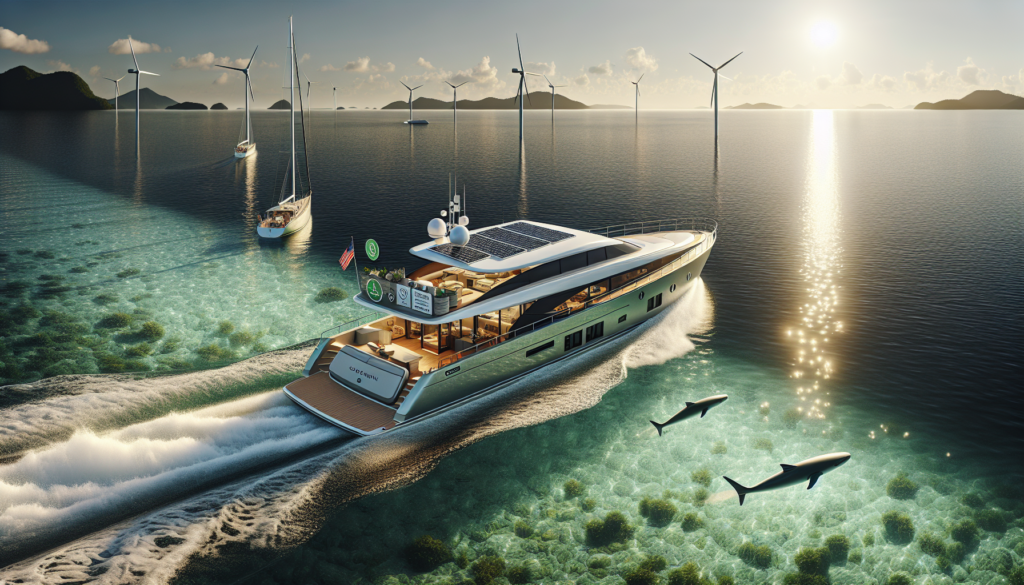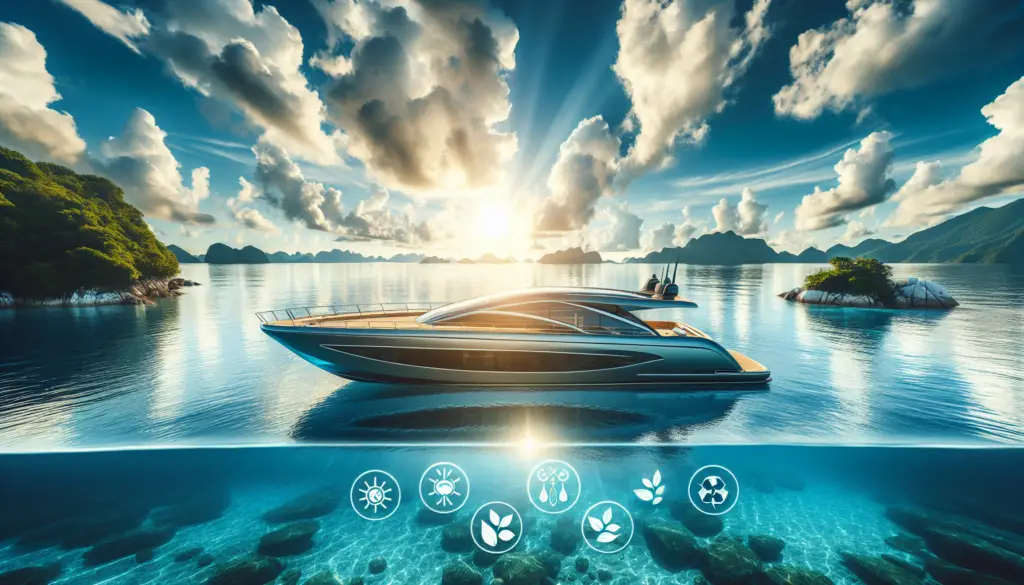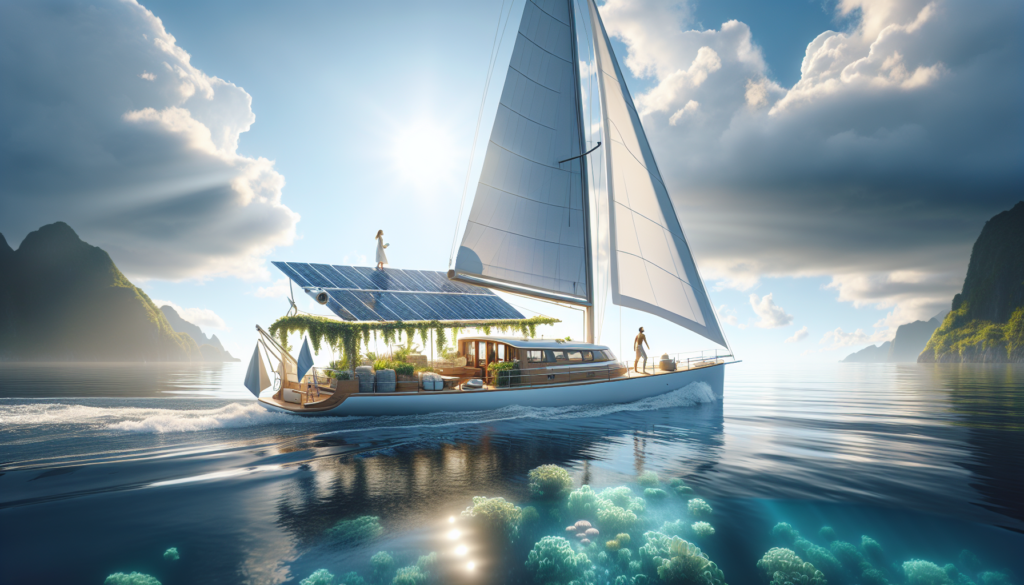Preparing for a boat trip soon? Well, hold your oars because “eco-friendly boating Travel Tips and Strategies” is about to make your adventure better and greener! This indispensable guide is filled with clever ways for maintaining and operating your boat in an environmentally conscious manner. From the choice of boat materials, fuel, and supplies to route planning and waste management, you’ll discover a host of tips designed to lessen your impact on marine ecosystems. So, whether you’re an experienced sailor or a novice, this guide is set to make you an eco-champion of the seas.

Understanding Eco-Friendly Boating
Eco-Friendly boating is all about reducing your carbon footprint and lessening your harm to aquatic ecosystems while enjoying the open waters. It’s an approach that values sustainable systems, responsible practices, and environmental awareness.
Defining Eco-Friendly Boating
Eco-Friendly boating refers to boating practices that mitigate environmental damage. It’s about minimizing your waste, using renewable energy when possible, reducing water and air pollution, and respecting marine life. Essentially, it’s about making choices – big and small – that benefit rather than harm our planet.
Importance of Eco-Friendly Boating
Eco-Friendly boating is essential for numerous reasons. Marine ecosystems are fragile and easily disturbed. Irresponsible boating practices can inadvertently harm these ecosystems – for instance, pollutants from boats can contaminate water and harm marine life. Eco-friendly boating provides an alternative, allowing us to enjoy boating without causing undue harm to the environment.
Misunderstandings about Eco-Friendly Boating
A common misconception is that eco-friendly boating is costly and inconvenient. But in reality, it can save you money in the long run – for instance, investing in fuel-efficient engines and using renewable energy sources can cut down on your fuel costs. Another misunderstanding is that it requires a complete lifestyle overhaul. In reality, even small changes can make a significant difference.
Eco-Friendly Boating Equipment
Being eco-friendly extends to the boating equipment you use. Choose materials and gear that have a low environmental impact, and try to invest in renewable energy.
Choosing Eco-Friendly Boating Materials
When buying or maintaining your boat, opt for materials that are sustainable and non-toxic. Consider repair instead of replacement to reduce waste, and if replacement is necessary, opt for recycled materials.
Investing in Alternative Energy Sources
Alternative energy sources, such as solar or wind power, are excellent for eco-friendly boating. Not only do they reduce your carbon footprint, but they can also be more cost-effective in the long run.
Using Low-Environmental Impact Equipment
Using equipment that has a low-environmental impact is essential. This might include things like energy-efficient appliances, engines and lighting, and non-toxic cleaning supplies.

Fuel Efficiency Strategies
Fuel efficiency is a significant aspect of eco-friendly boating. Less fuel used means less carbon dioxide emissions and less pollution.
Selecting Efficient Engines
Choose an energy-efficient engine marketed as environmentally friendly or designed with fuel efficiency in mind. This can drastically reduce your fuel consumption and emissions.
Proper Engine Maintenance
Regularly maintaining your engine can improve its efficiency and longevity and reduce the likelihood of oil or fuel leaks that can harm marine life.
Adopting Fuel-Efficient Driving Techniques
Adopting fuel-efficient driving techniques like gradual acceleration and maintaining a steady speed can further minimize your fuel consumption.
Waste Management on Boats
Effective waste management is crucial to prevent pollutants from entering the water and spoiling the marine environment.
Avoiding Single-Use Plastics
Single-use plastics are a major environmental issue. Choose reusable items whenever possible, and if you must use disposable items, ensure they are properly disposed of or recycled.
Implementing Effective Waste Disposal Systems
Installing an effective waste disposal system can make it easier to manage waste. Systems should include areas for storing rubbish, recyclables, and potential composting materials separately.
Recycling and Composting on Board
Recycling saves resources and reduces waste. Composting organic waste aboard can also significantly cut down on garbage and provide nutrient-rich soil for onboard planters.

Eco-Friendly Cleaning Methods
Finding eco-friendly cleaning alternatives can minimize the toxins entering the water from your boat.
Choosing Non-Toxic Cleaning Products
Non-toxic, biodegradable cleaning products are a great alternative to toxic cleaners. They’re less harmful to marine life and often perform just as well as their chemical counterparts.
Cleaning Procedures to Minimize Environmental Impact
Choose cleaning procedures that minimize runoff into the water, and always clean your boat away from the water when possible.
Awareness on Invasive Species
Invasive species can hitch a ride on your boat and wreak havoc on new ecosystems. Be sure to properly clean and check your boat before entering new water bodies.
Sustainable Fishing Practices
If you’re fishing, employing sustainable practices helps protect the health of fish populations and ecosystems.
Using Sustainable Fishing Equipment
Choose equipment that minimizes harm to the marine life, such as circle hooks, which are less likely to be swallowed by fish, and biodegradable fishing line, which won’t harm wildlife if lost or discarded.
Understanding and Respecting Fishing Regulations
Become knowledgeable about fishing regulations, which exist to protect fish populations and their habitats. Always respect size, season, and bag limits, and avoid fishing in protected areas.
Catch and Release Strategies
If you practice catch and release, familiarize yourself with techniques that maximize fish survival, such as using barbless hooks, keeping fish in the water as much as possible, and allowing fish to recover before releasing them.

Noise and Light Pollution
Noise and light pollution from boats can disrupt marine life behaviors and breeding patterns. It’s important to limit these as much as possible.
Understanding the Impact of Noise and Light Pollution
Noise pollution from boat engines can interfere with marine animals’ communication and navigation. Similarly, excess light can confuse animals and disrupt natural behaviors.
Reducing Noise Levels
Choosing a quiet engine, minimizing your speed, and avoiding sensitive areas during peak wildlife activity can reduce noise pollution.
Implementing Lower-Light Solutions
Using shades, reducing the brightness of your lights, and switching off unnecessary lights can lessen light pollution.
Responsible Anchoring
Anchoring can cause damage to the seabed and marine life. Adopting responsible anchoring practices helps minimize this impact.
Choosing Appropriate Anchorage Areas
Always try to anchor in areas with sandy or muddy bottoms, which are less harmful to marine life than coral or seagrass areas.
Using Eco-Friendly Anchoring Techniques
Techniques such as using the minimum amount of chain needed, ensuring your anchor is properly set to avoid dragging, and slowly retrieving your anchor can lessen the damage to the seabed.
Damage Reduction to Marine Life
To further reduce harm, avoid anchoring in areas known for their marine life, especially during breeding and spawning seasons.
Promoting Eco-Tourism in Boating
Eco-tourism in boating plays a pivotal role in educating people about the importance of sustainable travel and supporting local economies.
Educating passengers on Sustainable Travel
By educating passengers about the environment and sustainable travel practices, they can become more conscious of their own actions and potentially apply these lessons in other areas of their life.
Supporting Local Economy
Supporting local businesses and buying local products not only boosts the economy, but also reduces carbon footprint and supports sustainable practices.
Engaging in Responsible Wildlife Observation
Educate yourself and your passengers about responsible wildlife observation. Maintaining a respectful distance and avoiding disruptive behavior can ensure you aren’t causing any harm or stress to the animals.
Boating Safety and Regulations
Safety should always be the priority when boating, and practicing eco-friendly habits doesn’t mean compromising on that safety.
Maintaining Safety while Sustaining Environment
Eco-friendly and safety practices can work hand in hand. Things like maintaining your boat properly, creating a safe onboard environment, and ensuring that your practices adhere to safety regulations can protect both you and the environment.
Understanding and Adhering to Eco-Friendly Boating Regulations
Many areas have regulations concerning pollution, waste disposal, and wildlife protection. Familiarize yourself with these to ensure you are compliant and doing your part to protect the environment.
Taking part in Eco-Friendly Boating Trainings and Workshops
Attending eco-friendly boating workshops can increase your knowledge about sustainable practices, making your boating experiences more enjoyable and beneficial for the environment. So, explore this exciting world of eco-friendly boating and play your part in protecting our precious marine environments.

